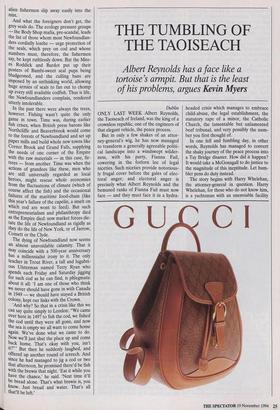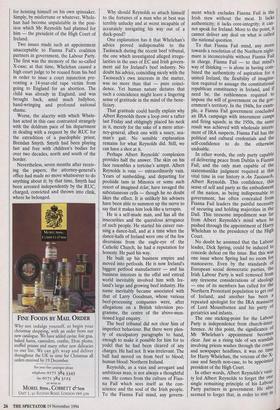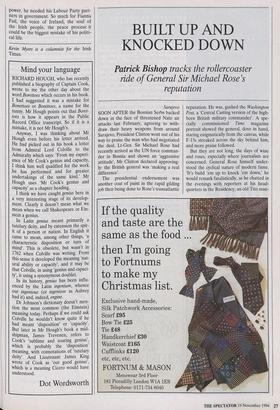THE TUMBLING OF THE TAOISEACH
Albert Reynolds has a face like a tortoise's armpit. But that is the least
of his problems, argues Kevin Myers Dublin ONLY LAST WEEK Albert Reynolds, the Taoiseach of Ireland, was the king of a crownless republic, one of the engineers of that elegant vehicle, the peace process.
But in only a few shakes of an attor- ney-general's wig, he has now managed to transform a generally agreeable politi- cal landscape into a windswept wilder- ness, with his party, Fianna Fail, cowering in the forlorn lee of legal niceties. Such niceties provide notorious- ly frugal cover before the gales of elec- toral anger; and electoral anger is precisely what Albert Reynolds and the bemused ranks of Fianna Fail must now face — and they must face it in a hydra- headed crisis which manages to embrace child-abuse, the legal establishment, the statutory rape of a minor, the Catholic Church, the lamentable but unlamented beef tribunal, and very possibly the num- ber you first thought of.
In one fell and fumbling day, in other words, Reynolds has managed to convert the shaky journey of the peace process into a Tay Bridge disaster. How did it happen? It would take a McGonagall to do justice to the magnitude of this ineptitude. Let hum- bler pens do duty instead.
The story begins with Harry Whelehan, the attorney-general in question. Harry Whelehan, for those who do not know him, is a yachtsman with an unenviable facility for hoisting himself on his own spinnaker. Simply, by misfortune or whatever, Whele- han had become unpalatable in the posi- tion which Mr Reynolds had planned for him — the president of the High Court of Ireland.
Two issues made such an appointment unacceptable to Fianna Fail's coalition partners in government, the Labour Party. The first was the memory of the so-called X-case; at that time, Whelehan caused a high court judge to be roused from his bed in order to issue a court injunction pre- venting a 14-year-old rape victim from 'going to England for an abortion. The child was already in England, and was brought back, amid much ballyhoo, hand-wringing and profound national shame.
Worse, the alacrity with which Whele- han acted in this case contrasted strangely with the doldrum pace of his department in dealing with a request by the RUC for the extradition of a paedophile priest, Brendan Smyth. Smyth had been playing fast and free with children's bodies for over two decades, north and south of the border.
Nevertheless, seven months after receiv- ing the papers, the attorney-general's office had made no move whatsoever to do anything about it; by that time, Smyth had been arrested independently by the RUC, charged, convicted and thrown into clink, where he belonged. Why should Reynolds so attach himself to the fortunes of a man who at best was terribly unlucky and at worst incapable of accurately navigating his way out of a duck-pond?
One explanation has it that Whelehan's advice proved indispensable to the Taoiseach during the recent beef tribunal, the one which investigated alleged irregu- larities in the uses of EC and Irish govern- ment aid for Ireland's beef industry. No doubt his advice, coinciding nicely with the Taoiseach's own interests in the matter, was no more than that — pure coinci- dence. Yet human nature dictates that such a coincidence might leave a lingering sense of gratitude in the mind of the bene- ficiary.
That gratitude could hardly explain why Albert Reynolds threw a loop over a rafter last Friday and obligingly placed his neck in it, merely for the sake of a mere attor- ney-general, albeit one with a saucy, sea- man's gait. No sensible explanation remains for what Reynolds did. Still, we can have a shot at it.
Perhaps Albert Reynolds' complexion provides half the answer. The skin on his face resembles a tortoise's armpit. Albert Reynolds is vain — extraordinarily vain. Years of sunbedding, and departing for poolside tans in Minorca or some such resort of imagined éclat, have ravaged the subcutaneous cells — though he no doubt likes the effect. It is unlikely his advisers have been able to summon up the nerve to say that it makes him look like a terrapin.
He is a self-made man, and has all the insecurities and the querulous arrogance of such people. He started his career run- ning a dance-hall, and at a time when the dance-halls of Ireland were one of the few diversions from the eagle-eye of the Catholic Church, he had a reputation for honesty. He paid his way.
He built up his business empire and moved into petfoods. He is now Ireland's biggest petfood manufacturer — and his business interests in the offal and entrail world inevitably involved him with Ire- land's large and growing beef industry. His name inevitably became associated with that of Larry Goodman, whose various beef-processing companies were, after allegations on a British television pro- gramme, the centre of the above-men- tioned legal enquiry.
The beef tribunal did not clear him of imperfect behaviour. But there were plen- ty of exculpatory paragraphs to hand, enough to make it possible for him for to yodel that he had been cleared of any charges. He had not. It was irrelevant. The ball had moved on from beef to blood; human blood: Northern Ireland.
Reynolds, as a vain and arrogant and ambitious man, is not always a thoughtful one. He comes from the culture of Fian- na Fail which sees itself as the con- science and the soul of the Irish people. To the Fianna Fail mind, any govern- ment which excludes Fianna Fail is the Irish stew without the meat. It lacks authenticity; it lacks core-integrity; it can- not speak for Ireland. More to the point, it cannot deliver any deal on what is called the national question. To that Fianna Fail mind, any move towards a resolution of the Northern night- mare is inconceivable without Fianna Fail in charge. Fianna Fail — to that mind's way of thinking — is alone in having com- bined the authenticity of aspiration for a united Ireland, the flexibility of imagina- tion required to assuage the constitutional republican constituency in Ireland, and if need be, the ruthlessness required to impose the will of government on the gov- ernment's territory. In the 1940s, for exam- ple, a Fianna Fail government concluded an IRA campaign with internment camps and firing squads; in the 1950s, the same result was achieved with wholesale intern- ment of IRA suspects. Fianna Fail has the political and cultural credentials and the self-confidence to do the otherwise undoable.
In other words, the only party capable of delivering peace from Dublin is Fianna Fail; and the only man capable of the statesmanlike judgment required at this vital time in our history is An Taoiseach, Albert Reynolds. This confidence, this sense of self and party as the embodiment of the nation, as being indispensable to government, has often concealed from Fianna Fail leaders the painful necessity of securing and holding majorities in the Dail. This tiresome impediment was far from Albert Reynolds's mind when he pushed through the appointment of Harry Whelehan to the presidency of the High Court.
No doubt he assumed that the Labour leader, Dick Spring, could be induced to concede defeat on the issue. But this was one issue where Spring had no room for manoeuvre. Even by the standards of European social democratic parties, the Irish Labour Party is well removed from any tiresome considerations of ideology — one of its members has called for the Northern Protestant population to get out of Ireland, and another has been a repeated apologist for the IRA massacre of Lord Mountbatten and his party of geriatrics and infants. The one sticking-point for the Labour Party is independence from church-inter- ference. At this point, the significance of Mr Whelehan's appointment becomes clear. Just as a rising tide of sex scandals involving priests washes through the courts and newspaper headlines, it was no time for Harry Whelehan, the veteran of the X- case and Smyth non-case, to be appointed president of the High Court. In other words, Albert Reynolds's vani- ty led Albert Reynolds to forget the one single remaining principle of his Labour Party partners in government. He also seemed to forget that, in order to stay in power, he needed his Labour Party part- ners in government. So much for Fianna Fail, the voice of Ireland, the soul of the Irish people, the peace process: it could be the biggest mistake of his politi- cal life.
Kevin Myers is a columnist for the Irish Times.




















































































 Previous page
Previous page